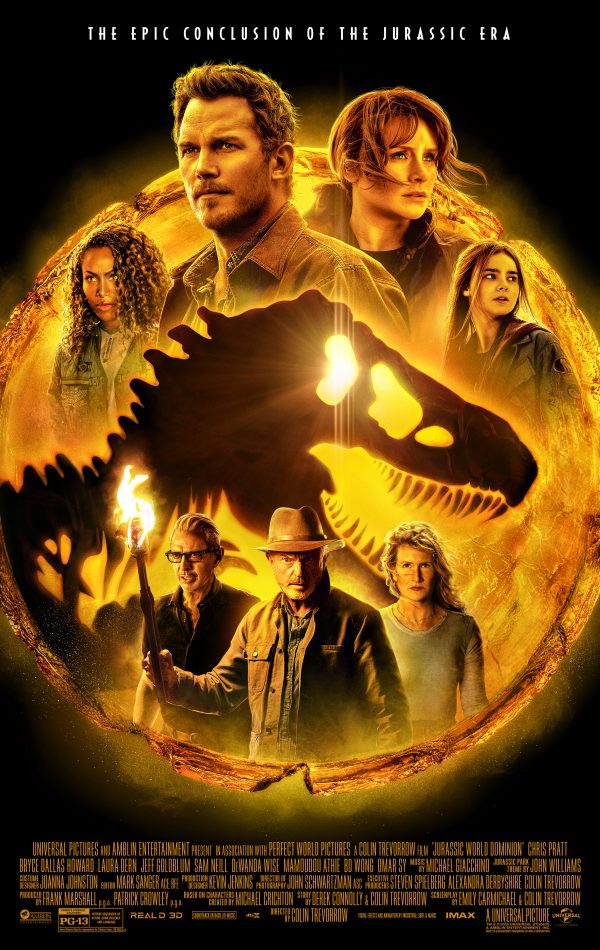
“Jurassic World Dominion” (2022). Cast: Chris Pratt, Bryce Dallas Howard, Laura Dern, Sam Neill, Jeff Goldblum, DeWanda Wise, Mamoudou Athie, Isabella Sermon, Campbell Scott, BD Wong, Omar Sy, Scott Haze, Dichen Lachman, Justice Smith, Daniella Pineda, Elva Trill, Jasmine Chiu. Director: Colin Trevorrow. Screenplay: Emily Carmichael and Colin Trevorrow. Story: Derek Connolly and Colin Trevorrow. Source Material: Michael Crichton, novel, Jurassic Park (1990). Web site. Trailer.
Some things bear repeating, especially when they’re important and have been disregarded or not taken seriously. It doesn’t matter how many times or how emphatically the message has been said, either. If the word is not getting through as effectively as it should be – or at all – then it needs reiteration, particularly when the stakes are high. Disparaging as that might be, that’s the point being driven home once again in the latest installment of a long-running sci-fi movie franchise, “Jurassic World Dominion.”
Picking up where this film’s predecessor, “Jurassic World: Fallen Kingdom” (2018), left off, the planet has fallen prey to a case of dinosaurs gone wild. In the wake of a catastrophic volcanic eruption that destroyed the creatures’ home on Isla Nublar, site of the Jurassic World theme park, the surviving dinosaurs are transferred to the estate of the park’s co-founder, from which they ultimately escape. And, as this sequel opens, the prehistoric beasts have managed to infiltrate the four corners of the world, wreaking havoc as they and humanity attempt to cohabit the planet.
The presence of the freely roaming dinosaurs serves as a backdrop – and constant threat – for the various plot strands that play out in the film, all of which echo the fundamental issue that gave rise to the underlying theme of this storied movie franchise: the potential dangers inherent in genetic manipulation. All of these diverse threads eventually converge, including the following:
- Former dinosaur trainer Owen Grady (Chris Pratt) and onetime Jurassic World operations manager Claire Dearing (Bryce Dallas Howard) live in a remote cabin in the Sierra Nevada Mountains as caretakers for Maisie Lockwood (Isabelle Sermon), the cloned daughter of a deceased high-profile research geneticist and granddaughter of the theme park’s co-founder, the one who harbored the surviving dinosaurs before they fled his Northern California estate. As Maisie enters her teenage years, she feels trapped in her isolated surroundings, hindered from exploring the wider world. However, Owen and Claire keep close tabs on their adopted daughter, knowing that there are forces desperate to get their hands on her because of her unique genetic identity. Owen and Claire are also informal caretakers of the last surviving velociraptor from Jurassic World, a dinosaur who lives in the adjacent wilderness and has apparently been able to asexually produce an offspring, making the creature a valuable commodity for poachers seeking to capture and sell it to the highest bidder.
- Lewis Dodgson (Campbell Scott) runs the multinational genetics corporation Biosyn, a company that claims to have the world’s best interests at heart yet secretly harbors agendas that are anything but beneficial to mankind. Much of this research is conducted on dinosaurs in hopes that discoveries involving their DNA can be tapped and made use of in the areas of health, medicine, agriculture and other endeavors. Dodgson is aided by his right-hand man, Ramsay Cole (Mamoudou Athie), an astute young corporate go-getter who’s being groomed for Biosyn’s future, unaware that he’s being played in order to help fulfill his boss’s nefarious agendas. And those secret plans have a wealth of significant implications for both man and nature.
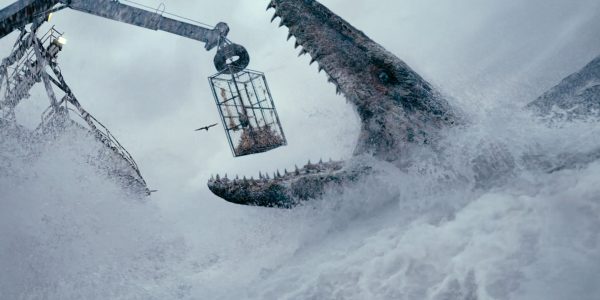
- Paleobotanist-turned-agricultural scientist Dr. Ellie Sattler (Laura Dern), one of the experts charged with evaluating the viability of Jurassic Park, the predecessor of Jurassic World, is troubled by the mysterious and highly selective destruction of crops by swarms of enormous, incredibly aggressive, allegedly extinct locusts in the American heartland. She soon learns that the spared crops are genetic hybrids produced by Biosyn, an initiative she suspects may be driven by the company’s intent to corner the seed market for high-profile agricultural commodities. She grows more suspicious when she discovers that the locusts in question may also be genetically modified, possessing altered DNA from insects of the Cretaceous Period, a clue that also hints at Biosyn’s involvement.
- Once-renowned paleontologist Dr. Alan Grant (Sam Neill) has quietly slipped out of the public eye, content to spend his days in relative seclusion working on one of his dinosaur digs. But his life is upended when he receives an unexpected visit from his onetime research partner (and former romantic interest), Ellie Sattler. She relates her suspicions about the genetically modified crops and locusts and wants to see if she can collect definitive evidence linking this curious coincidence to Biosyn. She asks for Grant’s help, hoping that trading on his reputation will help to get them inside the corporation’s isolated headquarters in Italy’s Dolomite Mountains. The duo also hopes to secure the assistance of a former colleague, chaos theorist Dr. Ian Malcolm (Jeff Goldblum), who now works for Biosyn and hopes that his position within the company will help him expose the corporation’s questionable agendas, particularly those hatched by former Jurassic World (and now Biosyn) geneticist Dr. Henry Wu (BD Wong).
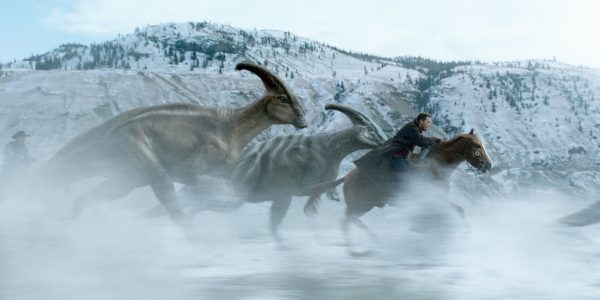
Thus begins the multipronged adventure that is “Jurassic World Dominion.” In addition to the foregoing story threads, the film takes viewers to a dinosaur black market facility on the island of Malta and follows the exploits of would-be kidnappers as they pursue Maisie and the baby velociraptor. The film also introduces other characters who become caught up in the fray, including Kayla Watts (DeWanda Wise), a tough-as-nails cargo plane pilot; Soyona Santos (Dichen Lachman), a broker in precious and unusual commodities; Rainn Delacourt (Scott Haze), a relentless poacher; Dr. Zia Rodriguez (Daniella Pineda), a dinosaur veterinarian and welfare advocate; Franklin Webb (Justice Smith) and Barry Sembène (Omar Sy), a pair of deep cover intelligence operatives; and Charlotte Lockwood (Elva Trill), Maisie’s late mother, who makes a number of remarkable revelations in videos from the past.
Explaining how all of these elements and characters ultimately come together would reveal too much. Suffice it to say, however, that the unfolding of this story yields a rip-roaring tale, punctuated by familiar but nevertheless stellar special effects and outstanding action-adventure eye candy. And, in its own singular way, the picture remains true to its core message, one that we should heed as science continues to advance, even if our species’ emotional maturity doesn’t always keep up.
The importance of that message can’t be overstated, either. Beginning with author Michael Crichton’s novel that inspired this franchise and all six of the movies that have been spun out of it, the caution has been the same. I wrote about it, too, in my review of the series’ original film, “Jurassic Park” (1993), in my most recent book, Third Real: Conscious Creation Goes Back to the Movies, but I went beyond the genetic manipulation issue to discuss a deeper, more fundamental matter – the question of responsibility. Indeed, as the creators of the reality we experience, we’re in charge of what we manifest, which means we carry the accountability that comes with such undertakings. But, as the films in this franchise have asked, are we truly paying attention to what we’re doing?
This is a hallmark consideration of the conscious creation process, the philosophy that maintains we manifest our existence through the power of our thoughts, beliefs and intents. Because of that, we have an infinite range of options for materialization available to us, given that it’s possible to conceive of virtually anything through these formidable metaphysical tools. But, just because we can envision something, does that necessarily mean we should proceed to bring it into being?
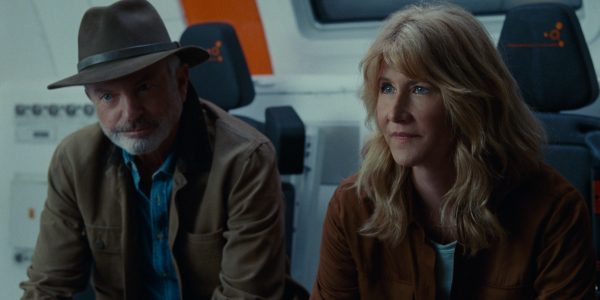
This notion has been present in the “Jurassic” films from the beginning, most notably through the impassioned assertions of Dr. Malcolm, who has steadfastly maintained that efforts to trick nature into fulfilling our whims won’t work because “it will always find a way” to achieve its own destined results. In all of the character’s movie appearances, he has posed this question. Unfortunately, it has largely fallen on deaf ears. In pointing out the potentially dire consequences of such actions, his contentions have nearly always been countered with such superficial retorts as “Yeah, but isn’t this cool?” or “Think of how much money we’ll make out of this.” Malcolm’s warnings have come as cautionary tales that have been blindly ignored for the sake of immediate and self-serving considerations, payoffs that pale in comparison to what could result.
What’s lacking in this discussion is a thoughtful sense of discernment. This element is essential to the manifestation process, because it provides much-needed perspective about what is being proposed. It goes beyond the beliefs behind what’s driving the core materialization; it delves into all of the beliefs caught up in this process, including those that may be present but less apparent. For instance, if the profit motive is the principal reason for creating dinosaurs for a theme park or for hybridizing seeds and insect predators, does this take into account what else is also possibly at stake? If the beliefs associated with those potential side effects are overlooked or willfully ignored through the practice of un-conscious creation or creation by default, in which outcomes effectively trump accountability, we run the risk of opening a can of worms whose fallout vastly overshadows whatever “benefits” may be attained by initiating those ventures in the first place. This is crucial, for example, when examining the endeavors launched in this film by the likes of Lewis Dodgson and Dr. Henry Wu.
This principle is by no means limited to the grand morality play on display here. It’s equally applicable to the countless everyday scenarios that come up in our lives. We should be cognizant of addressing it in all of our proposed undertakings, no matter what the scale involved. “Jurassic World Dominion” provides us with an obvious example of what’s at stake in a grand creation, but the underlying concepts are just as potentially pertinent to smaller, more mundane matters.
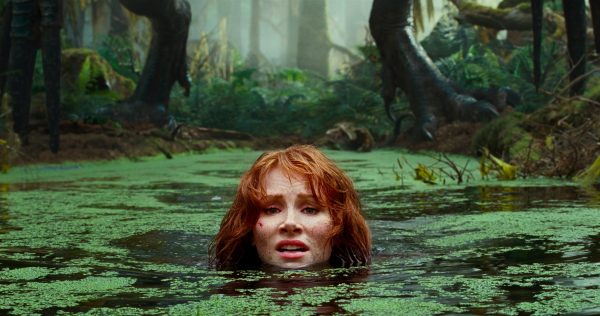
This is not to suggest that we should never attempt the untried, either. If we adopted such an overcautious stance, we would stall and stagnate, and there would be no forward progress in the evolution of almost any area of life. However, we need to make a concerted effort to be clear with ourselves about what we’re intending and what beliefs underlie those intentions, something that’s noticeably absent in the scrutiny (or lack thereof) of a number of the initiatives here.
Moreover, this is not to say that such ventures always yield negative results. Positive outcomes are possible, too. But, again, the underlying considerations must be taken into account. Maisie’s cloning, for example, might be seen as dangerous territory. However, when the process that resulted in her conception, birth, growth and maturation are considered, there are tremendously beneficial aspects associated with it that shouldn’t be overlooked or dismissed out of hand. Indeed, is it wise to summarily squelch such an undertaking in light of what it might yield compared to what it actually does? This is where the practice of temperament, an outgrowth of the discernment process, comes into play.
In the end, this story also shows us that we can learn valuable lessons about ourselves and our existence through experiences like this, difficult though they may be. If we grasp the messages that come out of these scenarios and actively apply them to our reality as we move forward, we can potentially reap great rewards. For instance, the experience of the “Jurassic” series of stories forces mankind to learn how to better coexist with the world around us. By developing a better relationship with nature and all of its components, perhaps we might adopt the same mindset when it comes to our coexistence with one another as a species. That could be seen as an unexpected, unintended side effect of this greater undertaking, but, considering what it might mean for humanity, wouldn’t that be worth it? It’s certainly food for thought.
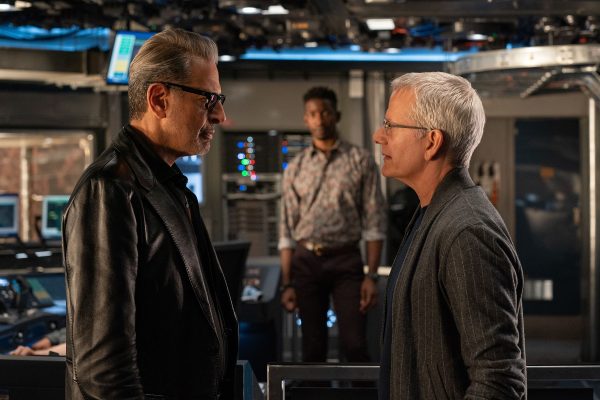
In the interest of full disclosure, I’ll admit up front that I wasn’t expecting much from this sixth installment in this storied, nearly 30-year-old franchise. And I’ll also admit that I wasn’t exactly bowled over by the result. However, I also wasn’t effusively disappointed by it, either, much to my surprise. While director Colin Trevorrow’s second offering in the franchise’s current trilogy admittedly goes on too long and has its moments of needless convolution, tedious pacing, monodimensional character development and tenuously strung-together plot threads (especially in the opening act), it’s nevertheless a vast improvement over the filmmaker’s laughable first effort in this series, “Jurassic World” (2015). In this outing, which features both returning “World” principals (Pratt, Howard, Wong and Sermon) and the reunion of the original trilogy’s protagonists (Neill, Dern and Goldblum, who is still in his top-notch quasi-creepy form), the film has found a better footing for mixing its action-adventure elements and decidedly campy moments. In addition, the picture effectively (though sometimes heavy-handedly) presents its points about the potential dangers of genetic engineering, the less-than-subtle need for all of us (both humans and nature) to get along, and the perils of unbridled corporate greed (disingenuous though that argument may be coming from its well-heeled producers/distributors). But, given what most viewers are here to see – the thrills and spills of grand adventure and superbly executed special effects – the picture handily delivers the goods throughout, even if some of them should have been pruned back somewhat. In all, this is a moderately satisfying summertime popcorn movie, one that truly doesn’t deserve to have been unceremoniously dumped upon to the degree it’s been denigrated (though don’t expect groundbreaking cinema, either).
And, as for all that talk about this being the finale in the franchise, I don’t buy it for a minute (just as I didn’t buy “The Rise of Skywalker” (2019) as being the last installment in the “Star Wars” franchise), so you can ignore those comments from critics and the film’s distributor about this offering being the end of the “Jurassic Park” mythology; it will almost assuredly be back when there’s as much revenue at stake as there is with this box office and merchandising cash cow. It may take some time to retool and come up with a new angle to breathe new life into it and this may be the last on-screen appearance by the original cast members, but the extinction of the franchise is not an option. Just ask the bean counters who are eagerly tallying the proceeds of this already-successful theatrical release.
When it comes to tackling an ambitious venture, implementing a little prudence may be a wise measure. Granted it might dampen one’s enthusiasm and be seen as timid in the face of bold experimentation. However, when efforts are left unchecked, matters can easily get out of hand and leave us with more “excitement” than we bargained for. So it’s with that in mind that we must ask ourselves, “Is that what we really want?” It’s disappointing when the best laid plans of mice and men go awry, particularly if scuttled in the planning stages. But that disappointment is nothing compared to the turmoil that can result when caution is recklessly thrown to the wind, as the “Jurassic” franchise has shown us so many times now. As Dr. Malcolm has long observed, dinosaurs disappeared because nature selected them for extinction. Let’s hope our own careless ways don’t trigger the same result.
Copyright © 2022, by Brent Marchant. All rights reserved.

No comments:
Post a Comment